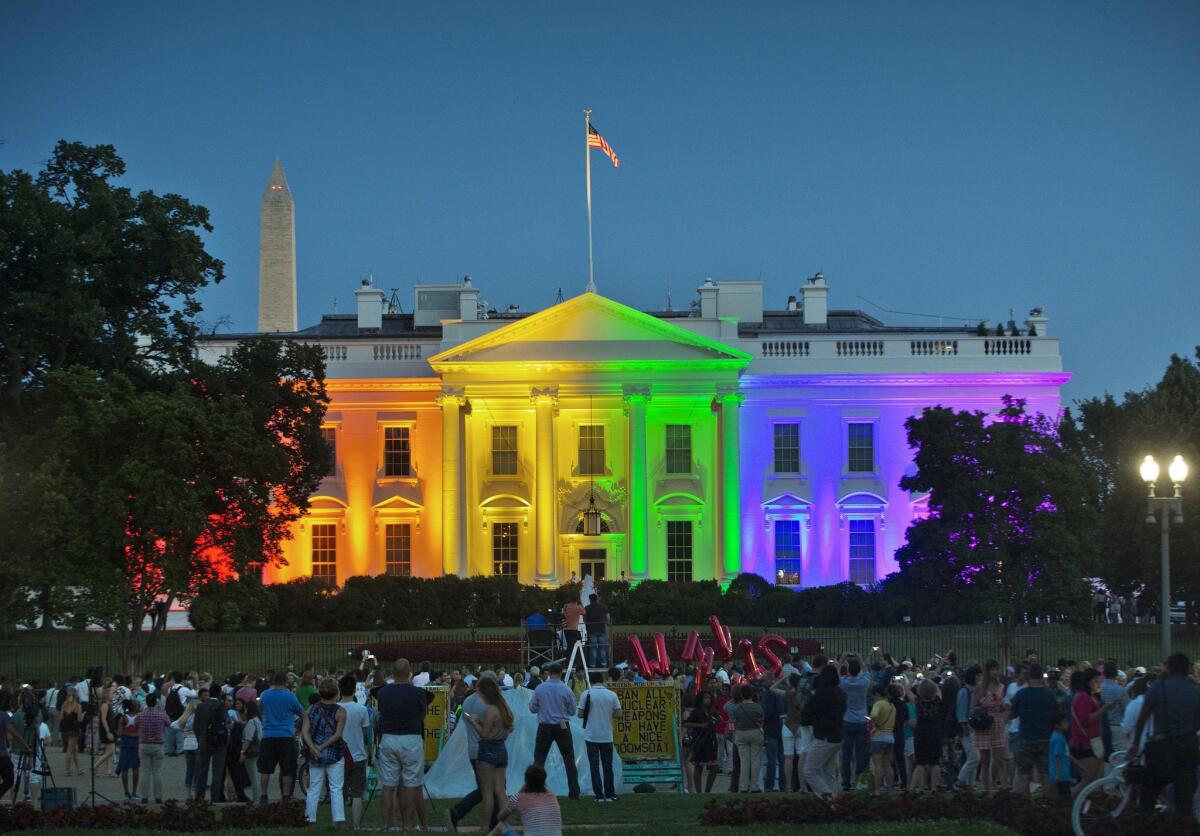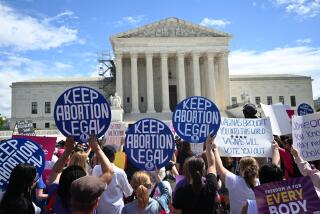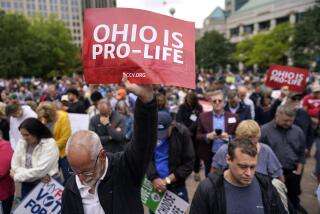Q&A: How will same-sex marriage ruling be enforced across the U.S.?

The White House is illuminated with rainbow colors in commemoration of the Supreme Court’s ruling to legalize same-sex marriage.
The Supreme Court ruling that legalized same-sex marriage in the U.S. raised many questions over the status of marriage in the country.
Some states are refusing to issue marriage licenses to gay couples. Religious leaders and business owners are wondering what effect the legalization might have on their practices.
The Los Angeles Times spoke with UC Berkeley law professor Melissa Murray about some of these questions. Murray specializes in family and constitutional law, which intersect when it comes to same-sex marriage rights.
Same-sex marriage is now legal in all 50 states, but does that mean anyone can get married within the U.S.?
“It should mean that,” Murray said. “But there’s already been some pushback from a number of states.”
Among those resisting the changes are Louisiana and Mississippi, which are delaying marriage licenses for same-sex unions until the Supreme Court issues an official mandate announcing that the ruling has taken effect. Mississippi issued three licenses to wed then called a halt, saying it is waiting for the U.S. 5th Circuit Court of Appeals to act.
Utah might join the resistance and refuse to issue marriage licenses to anyone -- gay or straight.
“You should think of Brown vs. the Board of Education, which desegregated schools,” Murray said, referring to the 1954 Supreme Court ruling that struck down separate-but-equal schools as unconstitutional. “But it actually took years for that to happen because so many Southern states dragged their feet.”
And same-sex couples might not be able to get married everywhere; churches, temples and other religious institutions could seek religious exemptions from the Supreme Court ruling.
Whether those exemptions would stand up under the Constitution is unclear, Murray said, but in states where gay marriage was already legal, most churches and religious leaders retained the freedom to reject same-sex vows.
Louisiana and Mississippi are not issuing marriage licenses to same-sex couples. What legal standing do they have to delay this process?
These states are on unclear legal ground.
“Think about abortion,” Murray said. “Women have a right to abortion, but the state doesn’t seem to have to furnish the ability to have one.”
Indeed, states don’t have to support or fund abortion clinics even though the Constitution protects women’s right to end a pregnancy.
In other words, even when rights are confirmed by the Constitution, states don’t necessarily have to provide avenues to exercise those rights. Actively denying those rights or outlawing their exercise is unconstitutional, but states may be able to circumvent same-sex marriages by avoiding marriage altogether.
Whether states have an obligation to furnish the mechanisms necessary to enter a marriage is unclear, Murray said. But equally unclear is the sustainability of a strategy of total avoidance, she added.
The governors of Texas and Louisiana hope to stop same-sex marriage. What options do they have?
“The Supreme Court is the court of last resort on the question,” Murray said. “Unless there’s another decision related to it, I don’t think they can go back to the courts.”
But a new, related case could spur the courts to clarify the extent to which states must facilitate same-sex marriages.
Did the Supreme Court leave any room for states to regulate marriage in any way?
States actually maintain plenty of leeway under the Supreme Court ruling to regulate marriage individually. But no states can outlaw same-sex marriage, Murray said.
“States can prescribe who may marry as long as it is within constitutional bounds,” she said.
She recalled Loving vs. Virginia, which struck down bans on interracial marriage.
Although states could not outlaw interracial unions, they could still issue a number of requirements -- blood tests, signatures, fees -- for marriage licenses as long as those requirements didn’t prevent couples of different races from tying the knot.
These same kinds of provisions can still be imposed by states as long as they don’t prevent same-sex couples from getting married.
Does everyone have to perform same-sex marriages, even if they are morally opposed?
The answer to this question is also unclear, Murray said. Most states that allowed gay marriages before the ruling also provided religious exemptions.
The 1st Amendment guarantees people the right to free expression, which could include expressing objections to same-sex marriage by not providing marriage services.
But the extent to which services can be denied and by whom will likely depend on future challenges to the law and more court rulings, Murray said.
What about other people in the marriage business? Do florists and bakers have to provide services to same-sex couples?
Again, the effect of the Supreme Court ruling is unclear. Previous challenges involving businesses turning away gay customers who were trying to throw a wedding have resulted in wins for the couples.
Most states faced with this question have affirmed in court that it is illegal to deny services to someone based on sexual orientation.
Still, Murray says, future lawsuits could influence these business owners and couples seeking clothing, food and decor for their wedding ceremonies.
Twitter: @katemshepherd
More to Read
Start your day right
Sign up for Essential California for news, features and recommendations from the L.A. Times and beyond in your inbox six days a week.
You may occasionally receive promotional content from the Los Angeles Times.






